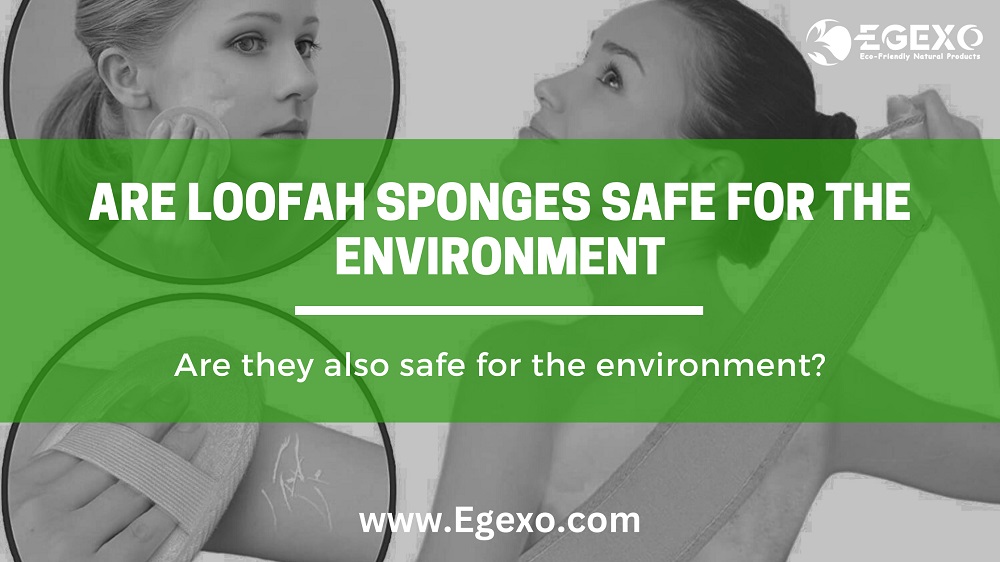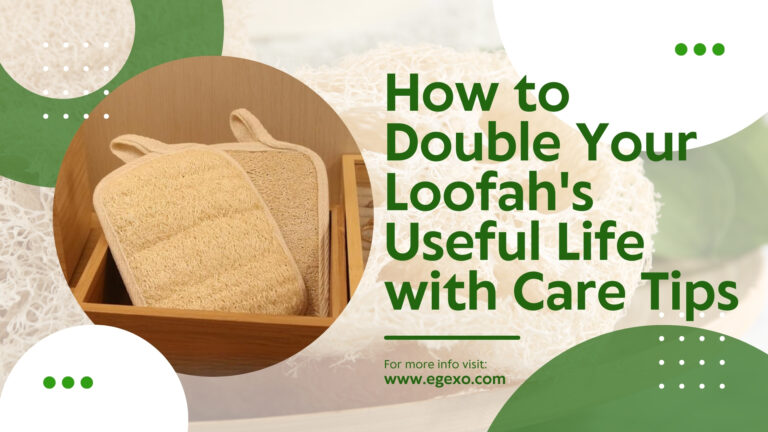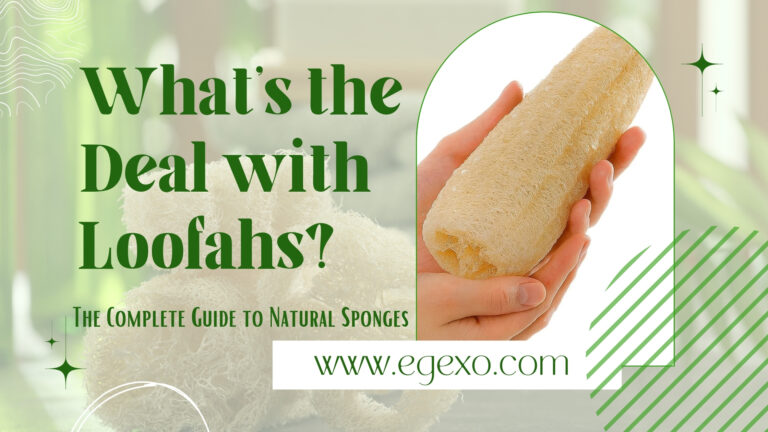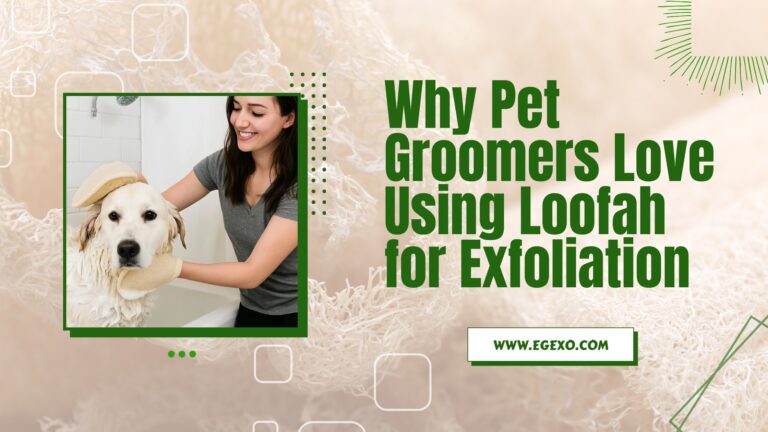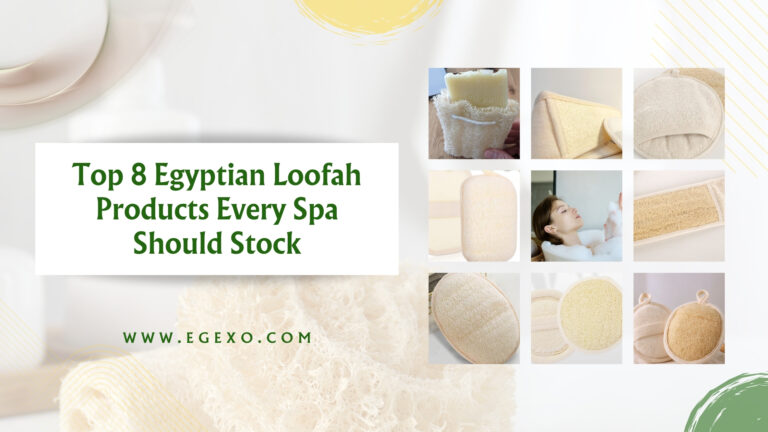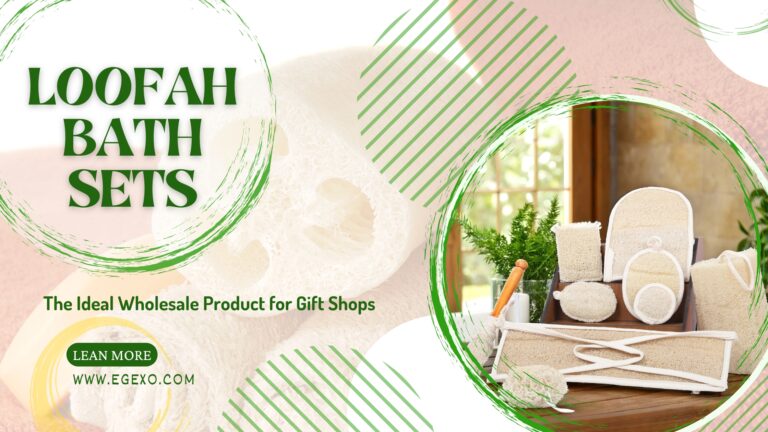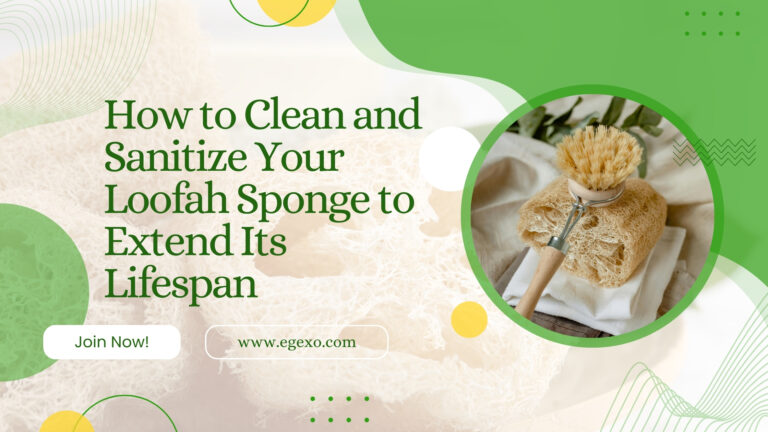Are Loofah Sponges Environmentally Friendly? The Complete Sustainability Guide 2025
Are Loofah Sponges Environmentally Friendly? The growing environmental crisis has pushed millions of consumers and businesses to reconsider their everyday products. If you are wondering whether loofah sponges are truly environmentally friendly, you have come to the right place. This comprehensive guide examines the environmental impact of natural loofah sponges compared to synthetic alternatives, backed by scientific evidence and industry insights.
Natural loofah sponges are among the most environmentally friendly bath and cleaning products available today. Made from 100% biodegradable plant fibers, these sustainable alternatives significantly reduce plastic waste while offering superior performance for personal care, kitchen cleaning, and commercial applications. The facts are clear: switching to natural loofahs represents one of the simplest yet most impactful environmental choices you can make.
In this detailed guide, you will discover the complete environmental profile of loofah sponges, understand why natural Egyptian loofahs outperform synthetic alternatives, learn proper care techniques to maximize sustainability benefits, and explore wholesale opportunities for businesses wanting to offer eco-friendly products to their customers.
Understanding Natural Loofah Sponges and Their Environmental Origins
Natural loofah sponges come from the luffa cylindrica plant, a fast-growing vine in the cucumber family that thrives in tropical and subtropical climates. The Egyptian Nile Delta region produces some of the world’s highest quality loofahs due to ideal growing conditions, traditional farming expertise, and sustainable cultivation practices refined over generations.
The luffa plant grows rapidly, reaching maturity in just 120 to 150 days. These vigorous vines can extend up to 30 feet, producing multiple gourds per plant throughout the growing season. This fast growth cycle means loofahs are a highly renewable resource that can be harvested multiple times per year without depleting soil nutrients or requiring extensive agricultural inputs.
When the cylindrical gourds reach full maturity, farmers harvest them and allow natural drying to occur. The outer green skin gradually loosens and can be easily removed, revealing the intricate network of fibrous material inside. This fiber structure, created entirely by nature, forms the perfect texture for exfoliation and cleaning applications.
After removal from the vine, the gourds undergo a careful drying process that preserves the natural fiber integrity. Once properly dried, the outer skin peels away, and the remaining material is cleaned, cut to size, and prepared for use. This entire process involves minimal processing and zero chemical treatments, making natural loofahs one of the purest body care and cleaning products available.
The cultivation of luffa plants actually benefits the environment in several ways. The fast-growing vines sequester significant amounts of carbon dioxide during their growth cycle. The plants improve soil structure through their extensive root systems. They require minimal pesticide use compared to conventional crops because the thick outer skin of the gourd naturally protects the interior fibers. Additionally, luffa cultivation supports biodiversity by providing habitat for beneficial insects and pollinators.
Egyptian loofah cultivation in the Nile Delta specifically follows sustainable agricultural practices that have been refined over centuries. Farmers rotate crops to maintain soil health, use organic growing methods whenever possible, and harvest at optimal maturity to ensure the highest quality fibers. This traditional approach creates superior products while minimizing environmental impact.
The Complete Environmental Impact of Natural Loofah Sponges
Natural loofah sponges offer remarkable environmental advantages that make them one of the most sustainable personal care and cleaning products available. Understanding these benefits helps both consumers and businesses make informed choices that support environmental health.
Biodegradability and Zero Waste Lifecycle
The most significant environmental benefit of natural loofahs is their complete biodegradability. When a natural loofah reaches the end of its useful life, it breaks down naturally in composting conditions within 30 to 60 days. The fibers decompose into organic matter that enriches soil rather than persisting in landfills or polluting waterways for hundreds of years.
This biodegradability extends throughout the product’s lifecycle. If small pieces break off during use, they simply decompose naturally without contributing to microplastic pollution. Natural loofahs can be composted in home composting systems, municipal composting facilities, or even buried directly in garden soil where they will break down and add organic matter.
The zero waste potential of natural loofahs aligns perfectly with circular economy principles. The product comes from a renewable plant source, serves its purpose for several weeks to months, and then returns to the earth to nourish new growth. This closed loop system represents the ideal environmental model.
Renewable and Sustainable Resource
Luffa plants are exceptionally sustainable from an agricultural perspective. Unlike products derived from petroleum or mined materials, loofahs come from plants that can be replanted and harvested indefinitely. Each growing season produces new crops without depleting finite resources.
The fast growth rate of luffa vines means resources are renewed quickly. A single plant can produce multiple harvestable gourds in one season, creating abundant supply without requiring vast agricultural acreage. This efficiency makes loofahs far more sustainable than many alternative crops.
Luffa cultivation requires relatively minimal water compared to other fiber crops once plants are established. The vines are naturally drought-tolerant and thrive with moderate watering. In regions with adequate rainfall, supplemental irrigation may be unnecessary, further reducing the environmental footprint.
Carbon Footprint and Climate Impact
Natural loofahs have a remarkably low carbon footprint throughout their lifecycle. The production process requires minimal energy input since processing involves primarily drying, cleaning, and cutting rather than energy-intensive manufacturing.
During their growth phase, luffa plants actively remove carbon dioxide from the atmosphere through photosynthesis. This carbon sequestration partially offsets any emissions associated with processing and transportation, resulting in a net positive environmental impact compared to manufactured alternatives.
The lightweight nature of dried loofahs means transportation requires less fuel compared to heavier products. A shipping container can hold thousands of loofah units, maximizing logistics efficiency and minimizing per-unit transportation emissions.
For businesses concerned about supply chain sustainability, sourcing natural loofahs represents one of the most environmentally responsible choices available. The combination of renewable sourcing, minimal processing, efficient transportation, and complete biodegradability creates an environmental profile that few products can match.
No Microplastic Pollution
One of the most critical environmental advantages of natural loofahs is the complete absence of microplastic pollution. Synthetic sponges shed tiny plastic particles during use and disposal, contributing to the microplastic crisis that now affects every ecosystem on Earth.
Research has revealed microplastics in the deepest ocean trenches, highest mountain peaks, human bloodstreams, and even developing fetuses. Synthetic bath and cleaning sponges represent a significant source of this pollution. Each time a synthetic sponge is used, tiny plastic fibers break away and enter water systems where they persist indefinitely and accumulate in food chains.
Natural loofahs shed only organic plant fibers if they break down during use. These natural fibers biodegrade quickly and harmlessly, causing zero pollution. For environmentally conscious consumers and businesses, eliminating microplastic sources represents one of the most important actions available.
The Devastating Environmental Impact of Synthetic Sponges
To fully appreciate the environmental benefits of natural loofahs, it is essential to understand the significant damage caused by synthetic alternatives. Synthetic sponges, bath poofs, and plastic scrubbers create environmental harm throughout their entire lifecycle.
Manufacturing and Resource Depletion
Synthetic sponges are manufactured from petroleum-derived materials including polyurethane foam, polyester, nylon, and various plastics. The extraction and refining of petroleum carries enormous environmental costs including habitat destruction, water pollution, greenhouse gas emissions, and the depletion of non-renewable fossil fuel resources.
The manufacturing process for synthetic sponges requires significant energy inputs and often involves toxic chemicals. Factories producing synthetic bath and cleaning products generate air pollution, water pollution, and chemical waste that must be managed to prevent environmental contamination.
Unlike renewable plant-based loofahs, every synthetic sponge produced draws down finite petroleum resources that cannot be replaced. The manufacturing industry’s dependence on fossil fuels contributes significantly to climate change and environmental degradation.
Persistence in the Environment
The most problematic aspect of synthetic sponges is their persistence in the environment. Plastic-based sponges can take 500 to 1000 years to break down, and even then they do not truly biodegrade. Instead, they fragment into smaller and smaller pieces of microplastic that persist indefinitely.
When synthetic sponges reach landfills, they occupy space permanently while potentially leaching chemical additives into soil and groundwater. Synthetic materials in landfills may release methane, a potent greenhouse gas, as organic contaminants mixed with the plastics undergo anaerobic decomposition.
Synthetic sponges that enter waterways cause immediate and long-term harm. They can entangle wildlife, be ingested by marine animals causing injury or death, and break down into microplastics that contaminate entire ecosystems. Ocean cleanup organizations regularly collect synthetic sponges and bath products from beaches and marine environments worldwide.
Chemical Additives and Toxins
Many synthetic sponges contain chemical additives including dyes, antimicrobial agents, fragrances, and softeners. These chemicals can leach into water during use and disposal, contributing to water pollution. Some antimicrobial agents used in synthetic sponges have been linked to the development of antibiotic-resistant bacteria, a growing public health crisis.
The bright colors of many synthetic bath poofs and sponges come from chemical dyes that may contain heavy metals or toxic compounds. When these products break down, the concentrated dyes release into the environment where they can harm aquatic life and contaminate water supplies.
For consumers with sensitive skin or chemical sensitivities, synthetic sponges can cause irritation, allergic reactions, or other adverse effects. Natural loofahs contain no synthetic chemicals, making them safer for both people and the environment.
Energy and Water Waste
The production, transportation, and disposal of synthetic sponges all require substantial energy and water inputs. Manufacturing facilities consume large quantities of water for cooling and processing. The heavy weight of synthetic products compared to natural loofahs means transportation requires more fuel per unit, increasing carbon emissions.
Disposal of synthetic sponges in incinerators creates air pollution and releases greenhouse gases. Even specialized plastic recycling programs rarely accept synthetic sponges due to contamination from organic matter and the mixed materials used in their construction.
Scientific Evidence Supporting Natural Loofah Environmental Benefits
Multiple research studies and environmental assessments confirm the superior environmental profile of natural plant-based products like loofahs compared to synthetic alternatives. Understanding this scientific foundation helps businesses and consumers make evidence-based decisions.
A lifecycle assessment comparing natural fiber products to synthetic alternatives consistently shows significant environmental advantages for plant-based options. These assessments measure environmental impact across multiple categories including resource depletion, energy consumption, greenhouse gas emissions, water pollution, and end-of-life disposal.
Studies on biodegradability demonstrate that natural plant fibers including luffa break down completely in composting conditions within weeks to months. The decomposition produces only carbon dioxide, water, and organic matter, all of which are natural components of healthy ecosystems. In contrast, plastic materials persist for centuries and fragment into microplastics that cause ongoing environmental harm.
Research on microplastic pollution has revealed the pervasive nature of this contaminant and traced significant sources to personal care and cleaning products. Natural loofahs eliminate this pollution source entirely, offering quantifiable environmental benefits that can be measured in reduced plastic particles entering waterways.
Carbon footprint analyses consistently show plant-based products sequester carbon during growth and require minimal energy for processing, resulting in lower overall greenhouse gas emissions compared to petroleum-based manufacturing. For businesses seeking to reduce their environmental impact, replacing synthetic products with natural alternatives like loofahs represents one of the most effective strategies available.
Why Egyptian Loofah Offers Superior Environmental and Quality Benefits
While natural loofahs from any source offer environmental advantages over synthetic alternatives, Egyptian loofahs from the Nile Delta region provide additional quality and sustainability benefits that make them the preferred choice for discerning consumers and businesses.
The Nile Delta’s unique climate creates ideal conditions for luffa cultivation. Warm temperatures, rich alluvial soil, adequate moisture, and strong sunlight produce loofahs with exceptional fiber density, durability, and texture. These superior growing conditions result in products that last longer, reducing the need for frequent replacement and further improving environmental impact.
Traditional Egyptian farming methods refined over generations emphasize sustainable practices that protect soil health and minimize environmental impact. Many Egyptian loofah farms practice crop rotation, use organic fertilizers, and avoid synthetic pesticides, creating products that align with organic and natural living principles.
The dense fiber structure of Egyptian loofahs means they maintain their integrity longer during use. A high-quality Egyptian loofah typically lasts four to six weeks with proper care, compared to lower quality alternatives that may deteriorate within two to three weeks. This extended lifespan reduces the total number of products consumed over time, multiplying the environmental benefits.
Egyptian loofah suppliers like EGEXO maintain rigorous quality control standards throughout the cultivation, harvesting, and processing stages. This quality focus ensures consistent products that meet the expectations of wholesale buyers, retailers, and end consumers. The reliability of premium Egyptian loofahs makes them ideal for businesses building sustainable product lines.
For businesses seeking to source environmentally responsible products, working directly with Egyptian loofah manufacturers provides additional sustainability advantages. Direct sourcing eliminates intermediary steps in the supply chain, reducing transportation impacts and ensuring transparency about cultivation and processing methods. You can learn more about the complete farm to export process that ensures quality and sustainability.
Proper Loofah Care Maximizes Environmental Benefits
Using natural loofahs properly and caring for them correctly maximizes their environmental benefits by extending product life and ensuring hygienic use. Following best practices allows each loofah to provide weeks or months of effective service before requiring replacement.
After each use, rinse your loofah thoroughly under running water to remove all soap residue, dead skin cells, or food particles. Squeeze the loofah firmly to expel as much water as possible. This simple step prevents moisture retention that can lead to premature deterioration or bacterial growth.
Hang your loofah in a well-ventilated location where air can circulate freely around it. Avoid leaving loofahs in enclosed shower caddies, on wet surfaces, or in areas without adequate airflow. Proper drying between uses prevents moisture-related problems and extends product life significantly.
For deep cleaning, soak your loofah weekly in a solution of water and white vinegar or water with a few drops of tea tree oil. Both vinegar and tea tree oil have natural antimicrobial properties that sanitize without harsh chemicals. After soaking for 5 to 10 minutes, rinse thoroughly and allow to dry completely.
You can also sanitize kitchen loofahs by placing them in boiling water for several minutes or running them through the dishwasher. These methods effectively eliminate bacteria while extending the useful life of your loofah.
Replace personal care loofahs every three to four weeks, or sooner if they develop an odor, show signs of deterioration, or become discolored. Kitchen cleaning loofahs may last longer depending on usage intensity. Timely replacement ensures hygienic use while still providing excellent environmental benefits compared to synthetic alternatives.
When your loofah reaches the end of its useful life, dispose of it responsibly by composting. Cut the loofah into smaller pieces to accelerate decomposition, add it to your compost bin or pile, and allow it to break down naturally. Within weeks, your old loofah will transform into nutrient-rich compost that can enrich garden soil.
For businesses selling loofahs wholesale or retail, educating customers about proper care extends product satisfaction while reinforcing the environmental benefits. Providing care instructions with product packaging demonstrates commitment to sustainability and customer success.
Comparing Loofah Environmental Impact to Other Natural Alternatives
While natural loofahs offer outstanding environmental benefits, how do they compare to other natural exfoliating and cleaning options? Understanding this landscape helps consumers and businesses make the most informed choices.
Natural sea sponges represent another traditional option for bathing and cleaning. These marine organisms offer gentle texture and natural antimicrobial properties. However, sea sponge harvesting raises sustainability concerns in some regions due to overharvesting and slow regeneration rates. Natural loofahs grow quickly on land-based farms, making them more reliably sustainable.
Sisal and other agave fiber products provide natural scrubbing options for household cleaning. These plant fibers are durable and effective but typically feel coarser and less comfortable for body care applications. Loofahs offer better versatility, serving both personal care and cleaning purposes effectively.
Cotton washcloths and bamboo cloths represent reusable fabric alternatives. While these options are more sustainable than synthetic products, they require frequent washing which consumes water and energy. Loofahs require only rinsing and air drying, making them more resource-efficient for daily use.
Konjac sponges made from konjac root offer ultra-gentle cleansing for facial skin. These specialized products work well for delicate applications but lack the durability and versatility of loofahs for full-body exfoliation or cleaning tasks. Many consumers use konjac sponges for facial care while preferring loofahs for body and household applications.
Natural bristle brushes provide firm exfoliation and work well for dry brushing techniques. However, bristle brushes require more maintenance, cannot create lather as effectively as loofahs, and may be too firm for some skin types. Loofahs offer a better balance of effectiveness, gentleness, and ease of use for most applications.
Among natural alternatives, loofahs consistently rank as one of the most environmentally friendly, versatile, and cost-effective options available. The combination of renewable sourcing, minimal processing, biodegradability, effectiveness, and affordability makes natural loofahs difficult to surpass for most personal care and cleaning applications. Explore the complete range of natural bath and body loofahs available for different needs and preferences.
Environmental Certifications and Standards for Natural Loofahs
For businesses sourcing loofahs wholesale and consumers seeking the most environmentally responsible options, understanding relevant certifications and standards helps identify truly sustainable products in a marketplace full of misleading claims.
Organic certification verifies that loofahs come from farms following organic agricultural practices without synthetic pesticides, herbicides, or chemical fertilizers. While organic certification is not universal in the loofah industry, it provides additional assurance of environmental responsibility when available.
ISO quality standards ensure consistent manufacturing and processing practices that minimize waste and environmental impact. Suppliers maintaining ISO certifications demonstrate commitment to quality management systems that include environmental considerations. EGEXO maintains strict quality standards throughout the cultivation and processing chain.
Fair trade certifications verify that farmers and workers receive fair compensation and work under acceptable conditions. This social sustainability component complements environmental sustainability, ensuring that eco-friendly products support both environmental health and human wellbeing.
Biodegradability certifications confirm that products break down naturally within specific timeframes under standardized composting conditions. While natural loofahs are inherently biodegradable, formal certification provides documented verification for businesses needing to substantiate environmental claims.
For businesses building sustainable product lines, working with suppliers who maintain relevant certifications provides credibility and reduces the risk of greenwashing accusations. Consumers increasingly scrutinize environmental claims, making third-party verification valuable for market positioning.
The Growing Market for Environmentally Friendly Natural Products
Understanding market trends helps businesses identify opportunities in the rapidly expanding sustainable products sector. Natural loofahs benefit from several converging consumer and business trends that favor environmentally responsible alternatives.
Consumer surveys consistently show that environmental concerns significantly influence purchasing decisions, particularly among younger demographics. Over 70% of consumers in major markets now consider environmental impact when making purchasing decisions, and a substantial percentage are willing to pay premium prices for genuinely sustainable alternatives.
The zero waste movement has gained remarkable momentum, with consumers actively seeking products that reduce packaging, eliminate plastic waste, and support circular economy principles. Natural loofahs align perfectly with zero waste values, making them popular in this growing market segment.
Regulatory trends increasingly restrict single-use plastics and require businesses to reduce environmental impact. Forward-thinking companies are proactively reformulating product lines and replacing synthetic materials with natural alternatives before regulations mandate change. Natural loofahs provide a proven solution that meets both current regulations and anticipated future requirements.
Retail buyers for major chains now commonly require environmental impact assessments and sustainability credentials from suppliers. Products demonstrating clear environmental advantages like natural loofahs receive preferential treatment in competitive retail environments. You can review comprehensive information about why choosing EGEXO provides sustainability advantages for your business.
The natural personal care market grows at over 8% annually, significantly outpacing conventional product categories. Within this expanding market, truly sustainable products with authentic environmental credentials command premium positioning and pricing. Natural Egyptian loofahs represent a cornerstone product for businesses building natural body care lines.
E-commerce growth has democratized access to specialty sustainable products, allowing small businesses to compete effectively by offering unique, environmentally responsible alternatives. Online marketplaces reward detailed product information about environmental benefits, providing natural loofah sellers with opportunities to educate consumers and differentiate their offerings.
Business Opportunities in Sustainable Loofah Products
For entrepreneurs, retailers, and distributors, natural loofahs represent exceptional business opportunities that combine strong profit margins with growing market demand and authentic sustainability credentials. Understanding these opportunities helps businesses capitalize on favorable market conditions.
The wholesale loofah market offers attractive margins at every level of the distribution chain. Direct sourcing from manufacturers like EGEXO provides the best pricing, enabling businesses to offer competitive retail prices while maintaining healthy profits. The lightweight nature of loofahs and minimal storage requirements reduce overhead costs compared to bulkier product categories.
Private labeling opportunities allow businesses to build distinctive brands around natural loofah products. Custom packaging creates shelf appeal while communicating environmental benefits and usage instructions. Private labeled loofahs command premium pricing compared to generic alternatives, improving profitability while building brand equity.
Product line expansion opportunities abound in the loofah category. Businesses can start with core body loofahs and expand into kitchen cleaning variants, pet grooming applications, raw loofah slices for crafters and soap makers, and specialty sizes for different market segments. This versatility allows businesses to serve multiple customer bases from coordinated inventory.
Subscription box models work excellently with loofahs since regular replacement is recommended every three to four weeks. Businesses can build recurring revenue streams by offering monthly loofah deliveries along with complementary natural body care products. The predictable replacement cycle makes loofahs ideal for subscription models.
Corporate and institutional sales represent significant opportunities for bulk loofah distribution. Spas, hotels, gyms, and wellness centers require consistent supplies of quality natural loofahs for guest amenities and services. Establishing relationships with commercial buyers creates stable, high-volume accounts.
International market expansion opportunities exist worldwide as environmental awareness grows globally. Natural loofahs appeal across cultures and demographics, making them ideal for businesses seeking to expand beyond domestic markets. EGEXO serves businesses across North America, Europe, Australia, South America, and worldwide with flexible minimums and reliable international shipping.
Educational content marketing about environmental benefits provides powerful differentiation for loofah businesses. Detailed blog posts, videos, social media content, and product descriptions that explain sustainability advantages attract environmentally conscious consumers while improving search visibility and establishing brand authority.
Ready to add environmentally friendly natural loofahs to your sustainable product line? Request a wholesale quotation from EGEXO to explore competitive manufacturer direct pricing on bulk orders. Our premium Egyptian loofahs provide the quality and consistency your business needs to succeed in the growing sustainable products market.
Educating Consumers About Loofah Environmental Benefits
For businesses selling natural loofahs and environmental advocates promoting sustainable alternatives, effectively communicating environmental benefits maximizes both impact and sales. Understanding how to convey these advantages creates stronger connections with environmentally conscious audiences.
Focus on specific, quantifiable environmental claims rather than vague sustainability language. Instead of simply stating that loofahs are eco-friendly, explain that they biodegrade completely in 30 to 60 days, eliminate microplastic pollution, come from renewable plant sources, and reduce plastic waste. Specific facts resonate more powerfully than general claims.
Compare environmental impacts directly to familiar alternatives. Explaining that a single natural loofah can replace multiple synthetic sponges that would persist in the environment for centuries makes the benefit tangible and personally relevant to consumers. Comparisons help consumers understand the magnitude of their individual impact.
Address common questions and concerns proactively. Many consumers wonder whether natural loofahs harbor bacteria, how long they last, or how to care for them properly. Providing clear, honest information builds trust while removing barriers to purchase. Including care instructions with products ensures customer success and satisfaction.
Use visual content to illustrate environmental concepts. Before-and-after images showing loofah composting, infographics comparing natural versus synthetic lifecycle impacts, and videos demonstrating proper care techniques engage audiences more effectively than text alone. Visual storytelling makes environmental benefits more memorable and shareable.
Share your sustainability story authentically. Businesses that source directly from sustainable farms can highlight farming practices, farmer relationships, and quality control processes that ensure environmental responsibility throughout the supply chain. Authentic storytelling builds emotional connections with conscious consumers. Learn about EGEXO’s comprehensive approach to sustainable loofah supply.
Encourage customers to share their own sustainability journeys. User-generated content showing how customers use natural loofahs as part of zero waste lifestyles, plastic-free households, or natural beauty routines provides social proof while creating community around shared environmental values. Customer stories often convince skeptical prospects more effectively than business marketing.
Provide complete transparency about product sourcing, processing, and environmental impact. Modern consumers value honesty and transparency, even when products are not perfect. Acknowledging areas for improvement while highlighting genuine environmental advantages builds credibility that blanket sustainability claims cannot match.
Taking Action for Environmental Impact
For individuals concerned about environmental health, switching from synthetic sponges to natural loofahs represents one of the simplest yet most impactful actions available. For businesses, offering sustainable alternatives like natural loofahs positions your company as an environmental leader while meeting growing consumer demand.
Consumers can make an immediate positive impact by replacing synthetic bath sponges, kitchen scrubbers, and cleaning tools with natural loofah alternatives. This single switch eliminates ongoing plastic waste, reduces microplastic pollution, and supports sustainable agriculture. The environmental benefits multiply over time as natural loofahs replace multiple synthetic products that would otherwise enter the waste stream.
Share information about natural loofah environmental benefits with friends, family, and community members. Personal recommendations carry tremendous influence, and helping others make sustainable switches amplifies your individual impact. Social media posts, blog content, and casual conversations all spread awareness that can shift market demand toward more sustainable products.
Support businesses that prioritize environmental responsibility by purchasing from companies committed to sustainable sourcing, transparent practices, and genuine environmental improvement. Consumer purchasing power drives business behavior, and supporting sustainable businesses encourages broader industry shifts.
For businesses, conducting a product line audit to identify opportunities to replace synthetic items with natural alternatives demonstrates environmental leadership while improving brand positioning. Natural loofahs often represent the easiest sustainable switch due to proven performance, consumer familiarity, and attractive economics.
Advocate for stronger environmental regulations and corporate responsibility standards. While individual actions matter, systemic change through policy and regulation creates the largest environmental improvements. Supporting organizations working toward plastic reduction, sustainable agriculture, and environmental protection amplifies individual impact.
Start your sustainable loofah business today or enhance your existing product line. Order sample products from EGEXO to evaluate premium Egyptian loofah quality firsthand, or schedule a consultation with our wholesale team to discuss customized solutions for your business needs.
Conclusion: Natural Loofahs as Environmental Champions
The evidence is clear and overwhelming: natural loofah sponges are genuinely environmentally friendly products that offer significant advantages over synthetic alternatives. From renewable plant-based sourcing and minimal processing to complete biodegradability and zero microplastic pollution, natural loofahs check every box for environmental responsibility.
For consumers seeking to reduce their environmental impact through everyday choices, switching to natural loofahs provides tangible benefits without compromise on performance or convenience. The superior exfoliating texture, effective cleaning capabilities, and satisfying user experience mean choosing sustainability does not require sacrifice.
For businesses navigating the transition toward more sustainable operations and product lines, natural loofahs represent a proven solution with strong market demand, attractive economics, and authentic environmental credentials. The combination of growing consumer preference for sustainable products, regulatory trends favoring natural alternatives, and genuine environmental benefits creates ideal conditions for loofah business success.
Egyptian loofahs from trusted suppliers like EGEXO provide the quality consistency, reliable supply, and sustainability credentials that serious businesses require. Direct manufacturer relationships ensure competitive pricing, customization options, and transparent sourcing that supports both business goals and environmental values.
The environmental crisis demands action at every level, from individual consumers to multinational corporations. Natural loofahs demonstrate that environmental responsibility and practical effectiveness can coexist successfully. Every synthetic sponge replaced with a natural loofah represents a small victory for environmental health that multiplies across millions of households and businesses worldwide.
The choice is simple: continue supporting products that damage the environment, or switch to natural alternatives that work better while protecting the planet for future generations. Natural loofahs make that choice easy, effective, and economically sensible for everyone involved.
Partner with EGEXO to bring premium, environmentally friendly Egyptian loofahs to your customers. With over 10 years of experience, ISO-certified quality standards, and proven export expertise to 40+ countries, EGEXO provides the sustainability and consistency your business demands. Contact us today to explore how natural loofahs can enhance your sustainable product offerings while growing your business profitably.
Visit the EGEXO shop to explore the complete range of environmentally friendly natural loofah products, download our comprehensive product catalog, or request a wholesale quotation to get started with premium sustainable loofahs for your business.
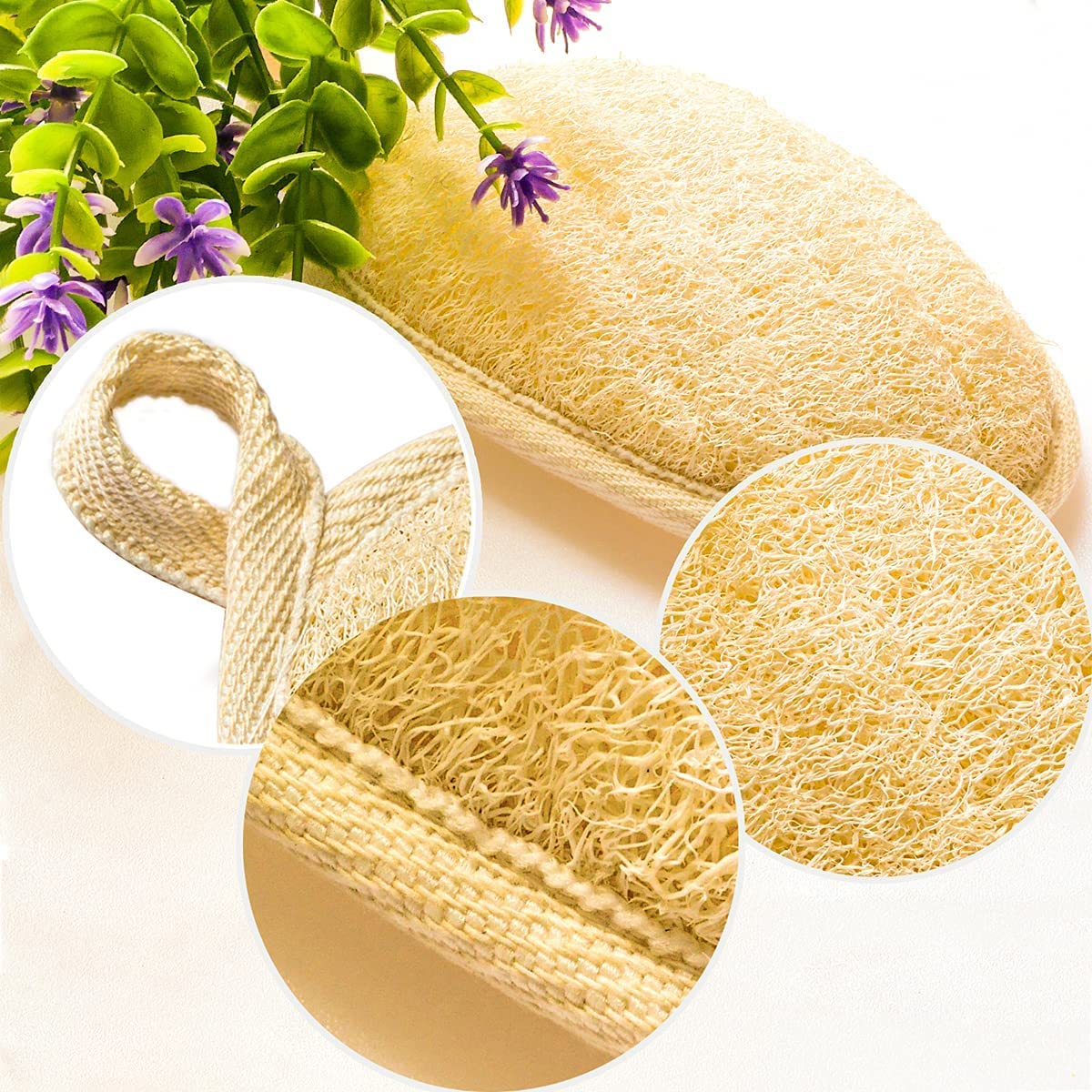
FAQ Section
Are natural loofah sponges better for the environment than synthetic sponges?
Yes, natural loofah sponges are significantly better for the environment than synthetic alternatives. Natural loofahs are 100% biodegradable, breaking down completely in 30 to 60 days in composting conditions. They come from renewable plant sources that sequester carbon during growth and require minimal processing. Synthetic sponges are made from petroleum-based plastics that persist in the environment for 500 to 1000 years, shed microplastics during use, and contribute to pollution throughout their lifecycle. Switching to natural loofahs eliminates plastic waste and microplastic pollution while supporting sustainable agriculture.
How long do natural loofah sponges last and when should they be replaced?
Natural loofah sponges typically last three to four weeks with proper care when used for personal body care applications. Kitchen cleaning loofahs may last longer depending on usage intensity. Replace your loofah sooner if it develops an odor, becomes discolored, shows signs of deterioration, or feels less effective. Proper care including thorough rinsing after each use, squeezing out excess water, and hanging in well-ventilated areas extends loofah life significantly. Even with regular replacement, natural loofahs provide superior environmental benefits compared to synthetic alternatives that contribute to permanent pollution.
Can natural loofahs be composted at home?
Yes, natural loofahs can be easily composted at home when they reach the end of their useful life. Cut the loofah into smaller pieces to accelerate decomposition, then add the pieces to your compost bin or pile along with other organic materials. Loofahs will break down naturally within several weeks to a few months, transforming into nutrient-rich compost that can enrich garden soil. This complete biodegradability represents one of the primary environmental advantages of natural loofahs over synthetic sponges that cannot break down naturally and must be disposed of in landfills where they persist indefinitely.
What makes Egyptian loofah more environmentally sustainable than other loofahs?
Egyptian loofahs from the Nile Delta region offer superior environmental sustainability due to several factors. The ideal growing conditions produce denser, more durable fibers that last longer during use, reducing the total number of products consumed over time. Traditional Egyptian farming methods emphasize sustainable practices including crop rotation, minimal pesticide use, and soil health maintenance. The longer lifespan of premium Egyptian loofahs means fewer replacements are needed, multiplying the environmental benefits. Additionally, direct sourcing from Egyptian manufacturers reduces supply chain complexity and transportation impacts. EGEXO maintains rigorous quality and sustainability standards throughout the farm to export process.
Do natural loofahs contain any chemicals or synthetic materials?
Natural loofahs contain no chemicals or synthetic materials when sourced from reputable suppliers. They are 100% plant-based products made from the dried fibrous interior of the luffa gourd. The processing involves only drying, cleaning, and cutting without chemical treatments, bleaching, or synthetic additives. This purity makes natural loofahs safe for sensitive skin and completely biodegradable. Some very low-quality suppliers may bleach loofahs or add treatments, so purchasing from established suppliers like EGEXO that maintain quality standards ensures you receive completely natural products without chemical contamination.
How do natural loofahs help reduce plastic pollution?
Natural loofahs help reduce plastic pollution in multiple significant ways. First, each natural loofah replaces several synthetic sponges that would otherwise contribute to landfills and environmental plastic accumulation. Second, natural loofahs produce zero microplastic pollution during use, unlike synthetic sponges that shed tiny plastic particles every time they are used. These microplastics enter water systems and accumulate in ecosystems causing widespread environmental harm. Third, when natural loofahs reach end of life, they biodegrade completely instead of fragmenting into persistent plastic particles. Finally, increased demand for natural loofahs supports sustainable agriculture rather than petroleum-based manufacturing industries.
Where can businesses buy environmentally friendly natural loofahs wholesale?
Businesses can purchase environmentally friendly natural loofahs wholesale directly from EGEXO, a leading Egyptian loofah manufacturer and exporter. Direct manufacturer sourcing provides competitive pricing, quality consistency, and sustainability transparency that intermediaries cannot match. EGEXO offers flexible minimum order quantities, international shipping to over 40 countries including the USA, Canada, Europe, Australia, and worldwide, plus customization options including private labeling and custom packaging. Request samples to evaluate premium Egyptian loofah quality or schedule a consultation to discuss specific business requirements and wholesale pricing structures for sustainable natural loofah products.

